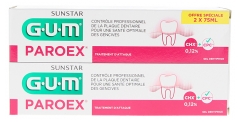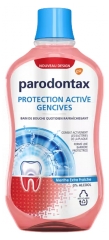Sore gums:
how to take care of these?
Written by Paul Musset, Doctor in Pharmacy | published on | updated on 27/06/2024

Swollen, painful gums, some even bleed while brushing your teeth, what is happening? Your gums are probably sore. This isn’t time to panic but to take care of the precious support of our teeth!
Gums, the fragile nest of teeth
What makes up our set of teeth?
Gums are made up of thick, richly vascularized, and innervated tissue. These support the teeth and are essential but also vulnerable! To understand the role of gums when it comes to dental health, we need to get familiar with the structure of our teeth..
The tooth is made up of a pulp which can be found at the center. This is where most of the blood vessels and nerve endings can be found. Then comes the dentin, a substance which is mostly mineral, but also contains a little organic matter that go through the nerves. Last but not least, a layer of enamel covers only the tip of the tooth. The roots, an invisible part, are surrounded by a thin cement, which looks like bone. We can find the alveolar-dental or periodontal ligament around it, which is a flexible tissue that helps amortize the movements of the tooth.
The gum line extends the mucous membranes of the mouth and englobes the jawbones (jaws) and surrounds the base of each tooth. It is grippy, which means stuck to the tooth, except at the tooth neck, where the visible part of the tooth can be seen, and this is where it forms a small flange, detached from the enamel.
Gums are important but fragile
The main function of the gum is to protect the bone and the tooth from external aggression. This is like a barrier against dirt and germs that could creep in and reach the bone, roots, or the nourishing bloodstream. Poor gum condition can impact eating, speech, and general health. However, gum is fragile: it is a soft tissue which is in direct contact with food, crossed through by small blood vessels and nerves, which are due to changes in temperature, friction and permanent pressure (while speaking or when we chew).
Sore gums: gingivitis
Swollen gums, bright red, shiny? Repeated bleeding while brushing or when you bite into an apple? Bad breath? Sensitive gums, slightly painful when in contact? You may be part of the 80% of the population, who come across or shall experience episodes of gingivitis, one day or another.
Gingivitis is a superficial inflammation of the gums. It is common and not serious. However, if you do not take care or don’t treat it, the inflammation can spread throughout the gum tissue: this is known as periodontitis. It can worsen to such an extent, that it can ultimately lead to tooth loss, through gum receding. Periodontitis is estimated to be the cause of 30-40% of tooth loss.
What are the causes of gingivitis? In the vast majority of cases, dental plaque and tartar are the main reasons. Dental plaque is a mixture of food debris and bacteria that build up on and between teeth, due to insufficient or poor brushing. This plaque overtime, which is the source of infection and inflammation, hardens and sticks to the tooth, in the form of tartar.
How to prevent and treat gingivitis?
The first step in preventing gingivitis is to brush your teeth regularly (at least twice a day). This must be done properly. We brush from the gum to the tooth with a brush that has very soft bristles, without neglecting any side. It is important to use a suitable toothpaste, which is gentle on the gums and strengthens the teeth, mainly through fluor. Cocooncenter offers you a selection of toothpaste, specially made for sensitive gums, which will relieve many annoyances. To clean the interdental spaces, it is recommended to use dental floss or special interdental brushes.
Moreover, don’t forget to visit your dentist at least once a year. The latter will descale your teeth which will often be enough to resolve simple gingivitis. Antibiotic treatment may sometimes be necessary, but while you wait for your appointment, you can begin with mouthwashes with an antiseptic solution, for a maximum of ten days. Antiseptic gels also exist which can be applied to the gums, but once again, the treatment cannot not be prolonged without medical advice because in the long run, it can unbalance the oral flora. For small unpleasant breath issues, there are sprays you can use to resolve the root cause of the issue.
Tobacco: the nemesis of gums
Sugar isn't the only fearsome enemy of teeth and gums! Smoking, in addition to all of its well-known harmful effects, increases the risk of sore gums. This is because smoke attacks tissues and small blood vessels, which reduce the oxygen supply and favor deteriorating the periodontium, while lowering the immune response. Nicotine is deposited on the teeth and comes in the way of the proper gripping of the gums, which promotes gum recession and infections. Last but not least, an increase in temperature in the mouth due to smoking, promotes the growth of bad bacteria.
Other causes of sore gums
- Cavities often begin without any symptoms, but once they reach the nerve endings, they cannot be ignored any longer. The infection can spread to the entire area and cause gum pain.
- Excessive consumption of sweets is very bad for the teeth and gums! Sugar turns into acid in the mouth and turns into a source of cavities and irritation.
- Diabetes can lead to the risk for gingivitis and periodontitis for several reasons: Firstly, hyperglycemia changes the composition of saliva and also comes in the way of the microcirculation, in the small gum vessels, which leads to the deterioration of the gums. Moreover, some anti-diabetic drugs tend to decrease salivation, which in turn increase the formation of tartar deposits.
- Canker sores are small and harmless, but very painful ulcers, that can be located on the gums, but also on the tongue and other oral mucous membranes. They disappear in about ten days.
- If the gum is painful, swollen, warm, possibly with a visible sore, this may be an abscess. It is important to quickly consult a doctor
- Bruxism or bruxomania is an involuntary movement of the jaws that often occurs while falling asleep and causes the upper teeth to strenuously rub against the lower teeth, either sideways or front to back. This leads to premature wear and tear of the teeth and also harms the gums.
- Hormonal changes can cause sore gums, for example during pregnancy.
- After the age of 50, and at times before in case of poor teeth maintenance, the gum tends to recede (gingival recession). It begins to show a part of the teeth which is normally hidden. This can lead to sore gums and tooth sensitivity.
It is possible to have perfectly healthy and pink gums, which are able to support the teeth and protect their roots! This begins with meticulous teeth maintenance, especially through the choice of a good quality gum-protective toothpaste!
The three key points to remember about sore gums:
- In majority of cases, sore gums are due to gingivitis, which corresponds to an inflammation of the gingival tissues without being serious, but it needs to be treated.;
- To prevent gingivitis, gentle and regular brushing with special gum care toothpaste is the best solution.
- Gingivitis is often caused due to tartar and plaque, but can also occur due to poorly placed braces, hormonal issues, diabetes....























